Cover
Group slams NMDPRA Boss Farouk’s Diversionary Newspapers Ads On $5.5 Million In Children’s Tuition Fees
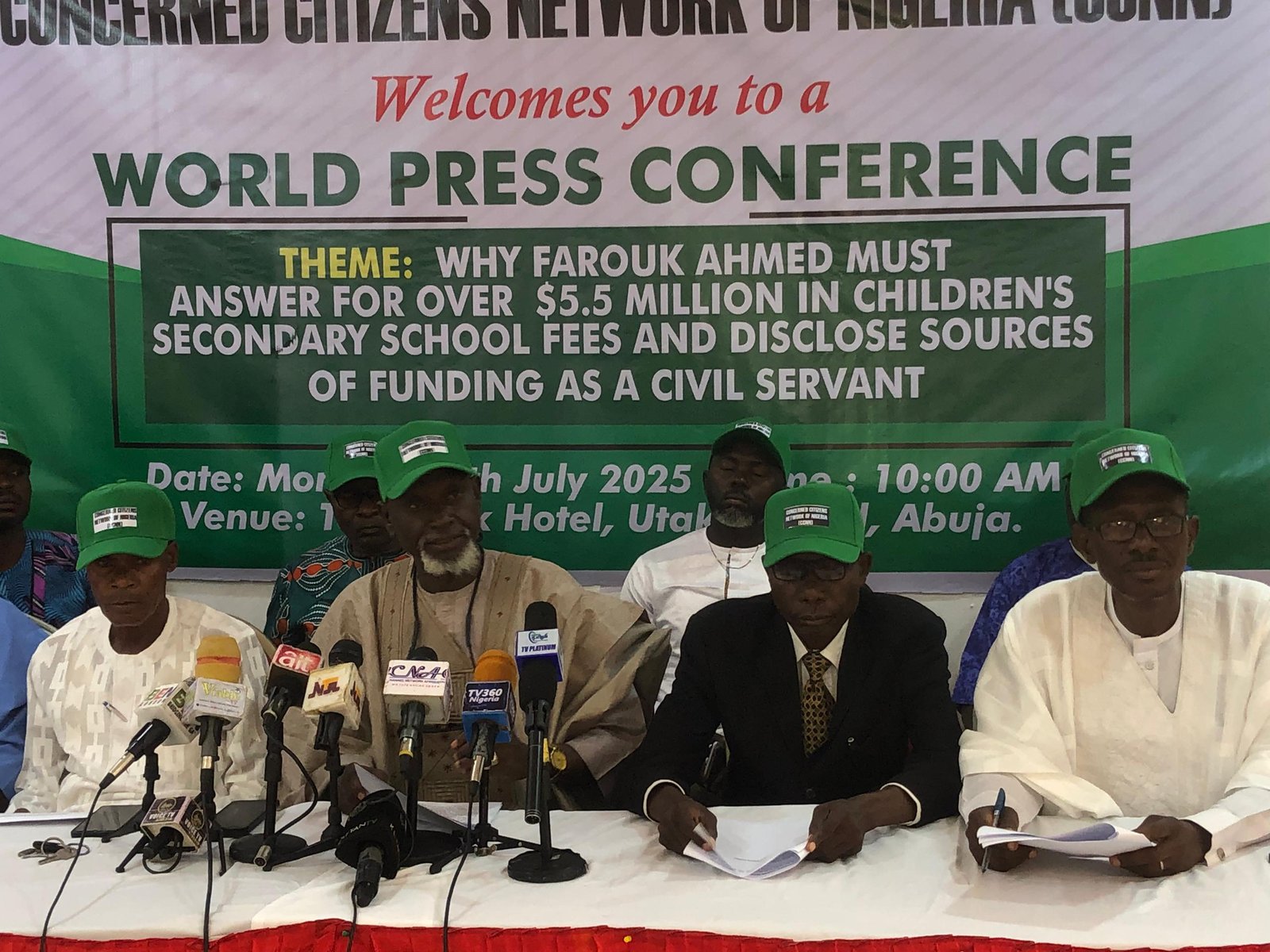
*charges relevant agencies to open immediate investigation.
The Concerned Citizens Network of Nigeria (CCNN) has slammed Engineer Farouk Ahmed, Chief Executive of the Nigerian Midstream and Downstream Petroleum Regulatory Authority (NMDPRA), for his full-page newspaper advertisements published on July 11, 2025, as a “disgraceful charade” and “diversionary” designed to dodge accountability.
The group said the ads, appearing on page 12 of Thisday, page 17 of The Guardian, page 15 of Vanguard, page 3 of BusinessDay, and page 19 of Daily Trust, were unsigned and devoid of substance, failing to address explosive allegations that Ahmed spent over $5.5 million (approximately N8.25 billion) on his children’s secondary education abroad.
In a fiery press conference on Monday in Abuja, the CCNN, led by Dr. Emmanuel Agibi, demanded an immediate investigation, accusing Ahmed of insulting Nigerians’ intelligence with his evasive tactics.
The CCNN highlighted that Ahmed’s children—Faisal Farouk attended the Montreux school, Farouk Jr attended the Aiglon college, Ashraf Farouk attended the Institut Le Rosey while Farhana Farouk attended the La Garenne International School for six years each.
With annual tuition and upkeep exceeding $200,000 per school, the total cost for the four children is estimated at $5 million, or roughly $1.2 million per child over six years.
“The cost per child included annual tuition fees of approximately $130,000–$150,000 and an additional $50,000 for upkeep, flights, and other expenses. For each child, this amounts to roughly $180,000–$200,000 annually, or $1,080,000–$1,200,000 over six years,” the statement said.
“For four children, the total expenditure ranges from $4,320,000–$4,800,000. Even now, questions remain unanswered about the tertiary education of Ahmed’s children. Having completed their secondary education, Faisal, Farouk Jr., Ashraf, and Farhana are enrolled in prestigious universities abroad, where annual costs often exceed $70,000–$100,000 per student.
“Further compounding public outrage, Engr. Farouk Ahmed’s son recently graduated from Harvard University, where tuition and associated costs exceeded $152,000, with additional expenses in the range of $100,000. This extravagant expenditure, far beyond the gross earnings of a civil servant of his calibre, places an immense burden on Nigeria’s poor taxpayers, many of whom struggle to afford three meals a day or school uniforms for their children, particularly in the northern regions.
“Notably, Ahmed has never held employment outside his role with the Federal Government since leaving school, raising further questions about the source of his wealth. The opulence displayed in funding such elite education underscores a stark disconnect between Ahmed’s lifestyle and the economic realities faced by ordinary Nigerians.”
The group urged the Code of Conduct Bureau (CCB), Independent Corrupt Practices Commission (ICPC), and Economic and Financial Crimes Commission (EFCC) to investigate how a civil servant’s salary could fund such lavish expenditure.
“In a nation where over 10 million children, particularly in the north, lack access to basic education, this lavish spending by a public servant is not merely a matter of personal choice—it is a moral outrage,” the statement added.
“While countless Nigerian families struggle to afford primary schooling, Ahmed’s children attended secondary institutions costing more per term than the annual budgets of some federal colleges. This stark inequality represents an injustice that cannot be ignored.
“The absence of transparency regarding how these ongoing expenses are funded further fuels public suspicion. If Ahmed’s wealth can support such elite secondary and tertiary education, the public deserves to know the legitimate sources of these funds, especially given his role as a public servant accountable to Nigerian taxpayers.
“The CCNN’s allegations are grounded in rigorous evidence, stemming from a petition to the Attorney-General of the Federation after weeks of verification, fact-finding, and public record reviews.We question how a public official, whose salary is known and whose assets must be constitutionally declared, could finance such an extraordinary level of overseas education without a visible commercial empire or disclosed inheritance.
“The petition raises serious concerns about potential abuse of office, asset concealment, or diversion of public funds under Ahmed’s leadership at NMDPRA. Public response has been resolute, with peaceful protests by lawyers, students, and civic groups targeting the Attorney-General’s office, ICPC, EFCC, National Assembly, and NMDPRA headquarters. These demonstrations, supported by formal letters and placards, demanded a transparent investigation.
“The NMDPRA’s attempt to dismiss these voices as ‘faceless’ is a cynical effort to undermine lawful civic engagement, further eroding public trust. The NMDPRA’s statement conspicuously avoided addressing key issues: it did not deny the children’s attendance at the listed secondary schools, nor did it provide any breakdown of how tuition was funded.
“It offered no details on asset declarations, loans, business income, family inheritance, or blind trusts, relying instead on vague appeals to Ahmed’s ‘reputation’ and ‘integrity.’ In a democracy, such claims are insufficient when a public servant’s lifestyle appears misaligned with their declared income. The burden of proof rests with Ahmed, not the public.
“The CCB, ICPC, and EFCC have constitutional mandates to investigate cases of unexplained wealth, ensuring that public officials are held accountable. This case tests the credibility of President Bola Tinubu’s anti-corruption and transparency agenda. The CCNN is not calling for Ahmed’s immediate removal but for an open, independent investigation. If he is innocent, a transparent process will vindicate him.
“However, continued silence risks tarnishing both his reputation and the government’s reform efforts. Ignoring these allegations would be a grave miscalculation. The CCNN is submitting additional letters, pursuing legal action, and mobilising further protests to ensure accountability. Civic vigilance is not a nuisance—it is the cornerstone of a functioning democracy.
“Engr. Farouk Ahmed must step forward, disclose his funding sources, and submit to a full inquiry. This is not persecution—it is the price of public trust. The CCB, ICPC, and EFCC must act swiftly to investigate these allegations, ensuring that justice and transparency prevail.”
Cover
Citizen Network Condemns NAFDAC’s Enforcement of Sachet Alcohol Ban, Warns of Mass Action
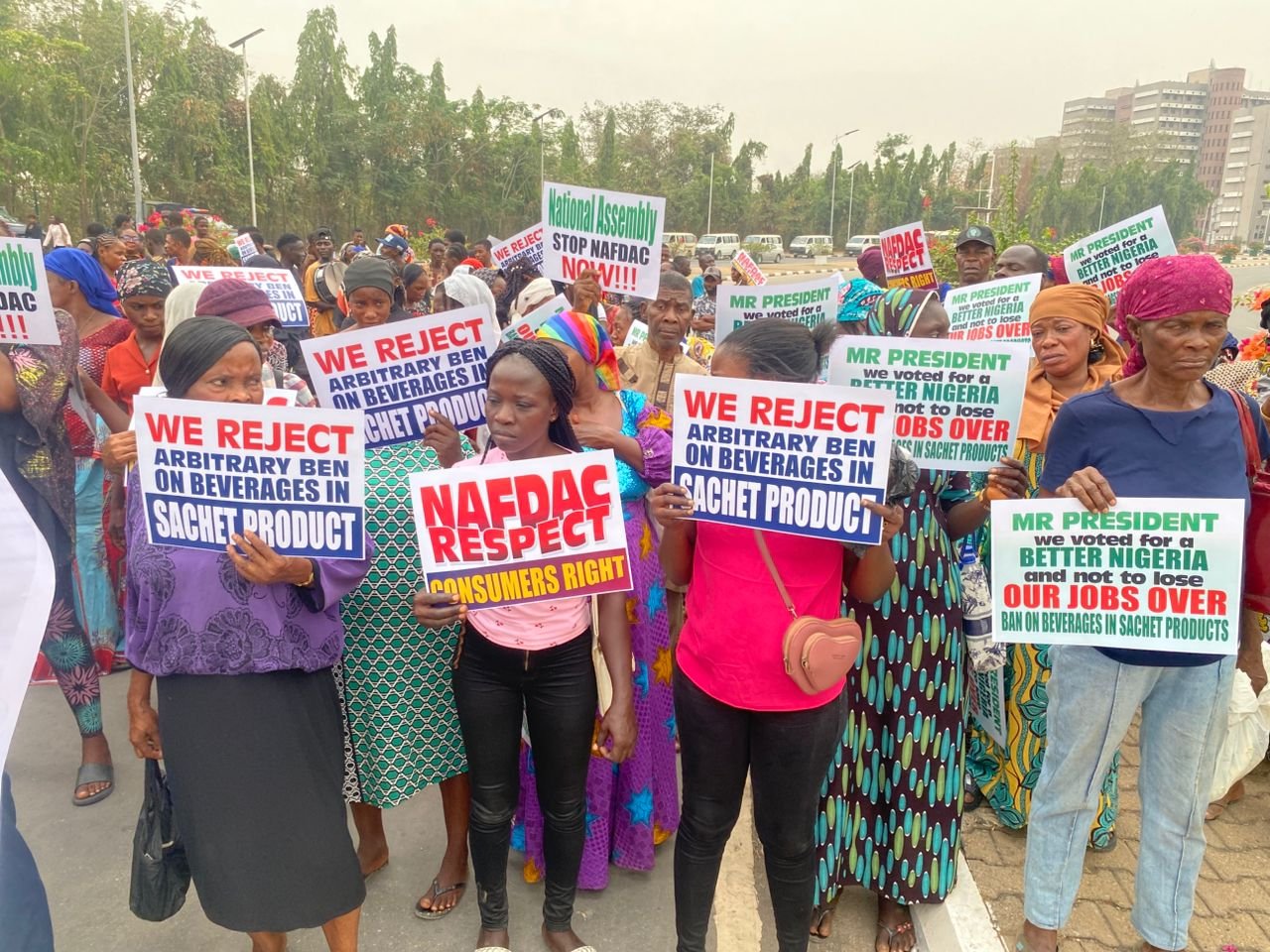
The Citizen Network has strongly criticized the National Agency for Food and Drug Administration and Control (NAFDAC) over its decision to commence the enforcement of a ban on sachet alcoholic beverages, describing the action as arbitrary, anti-people, and detrimental to the nation’s economy.
Speaking in Abuja on Tuesday, the group’s representative, Comrade Johnson Kolawole Michael, expressed concern that the enforcement, announced under the leadership of NAFDAC Director-General, Professor Mojisola Christianah Adeyeye, is disrupting the livelihoods of workers and operators in the wines and spirits sector, a segment the group said contributes significantly to Nigeria’s Gross Domestic Product (GDP).
According to the Citizen Network, the decision contradicts an earlier directive issued by the Office of the Secretary to the Government of the Federation (SGF) on December 15, 2025, which instructed that enforcement of the ban be suspended.
The group also noted that the action runs contrary to resolutions of the House of Representatives contained in document NAS/10/HR/CT.33/77c of March 14, 2024, where lawmakers, following public hearings and consultations with stakeholders, restrained NAFDAC from implementing the ban, describing it as unacceptable and anti-people.
The group accused NAFDAC of selectively relying on a Senate resolution that, it claimed, excluded critical stakeholders and failed to reflect public opinion. It disclosed that it has formally approached the Senate, expressing confidence that lawmakers would reconsider the matter after further consultations.
Comrade Michael said the conflicting directives from different arms of government have created confusion among industry operators, leaving them uncertain about which authority to comply with.
He further argued that sachet and small PET bottle alcohol products were introduced to cater to adult consumers with limited purchasing power and that banning them would deny such consumers their fundamental right of choice. He dismissed claims that sachet alcohol encourages abuse, stating instead that smaller portions help discourage excessive consumption typically associated with larger containers.
The Citizen Network also maintained that sachet alcoholic beverages produced locally meet hygienic standards and are duly certified by regulatory bodies, including NAFDAC. It added that allegations of underage abuse have been countered by independent empirical research, while industry players have invested over ₦1 billion in nationwide campaigns promoting responsible alcohol consumption and discouraging underage drinking.
While reaffirming its support for the removal of unsafe products from the market, the group insisted that regulatory decisions must be guided by empirical evidence rather than sentiment. It warned that the ban could lead to factory closures, job losses, and the influx of illicit, substandard, and smuggled alcoholic products, thereby depriving government of revenue and consumers of regulated options.
The Citizen Network called on President Bola Ahmed Tinubu, members of the National Assembly, and concerned Nigerians to intervene and urge the NAFDAC Director-General to halt the enforcement of the ban and comply with existing directives suspending it.
The group warned that failure to heed the call could leave it with no alternative but to embark on a nationwide mass action.
Cover
How Army, DSS, DIA foiled coup to topple, kill Tinubu

A covert intelligence operation coordinated by the Army Headquarters, the State Security Service (SSS), and the Defence Intelligence Agency (DIA), helped thwart a deadly plot to overthrow President Bola Tinubu’s government and assassinate key political figures, PREMIUM TIMES can authoritatively report.
Multiple senior administration insiders said the plot began to unravel in late September 2025 after an unnamed military officer with direct knowledge of the coup contacted the then Chief of Army Staff, Olufemi Oluyede. The officer reportedly disclosed the scheme, saying he feared being implicated as an accessory to treason if he failed to alert authorities.
Our sources said around the same time, the SSS independently gathered intelligence indicating that some serving army officers were plotting to “destabilise the government and undermine Nigeria’s democracy.” An official familiar with the matter said the Director-General of the SSS, Oluwatosin Ajayi, personally briefed Mr Oluyede on the findings.
Faced with converging intelligence from multiple sources, the two security chiefs agreed to act swiftly. A wide-ranging but discreet joint operation was launched by the army and the SSS, with coordinated arrests planned across different parts of the country to neutralise the coup’s masterminds and other collaborators.
On 30 September 2025, as President Tinubu travelled to Imo State for an official visit, unaware of the plot to depose and possibly assassinate him, the joint operation went into effect. The sweep led to the arrest of the alleged principal architects of the coup, alongside other military and civilian suspects.
The Chief of Defence Intelligence (CDI), Emmanuel Undiandeye, and the then Chief of Defence Staff, General Christopher Musa, were subsequently briefed. Mr Undiandeye was then requested to detain the suspects in the underground holding facility of the Defence Intelligence Agency.
Following the initial arrests, President Tinubu was formally informed of the foiled plot. A visibly shaken president immediately ordered the cancellation of the 1 October National Independence Day parade. He also approved the constitution of a special investigative panel, which later led to additional arrests. The investigative panel was led by General Undiandeye.
One of the detained soldiers later escaped custody but was rearrested by SSS operatives in Bauchi, a military insider said. Meanwhile, a retired officer identified as General Adamu and a former governor, Timipre Sylva, accused of bankrolling the coup plotters, remained at large.
Mr Tinubu later fired and retired the then Chief of Defence Staff, General Musa as well as the chiefs of the navy and airforce. Mr Oluyede was appointed CDS and promoted to the rank of General. Weeks later, Mr Musa returned to government as minister of defence.
In a statement issued on 4 October, the Defence Headquarters said the arrested officers were being investigate for “indiscipline and breach of service regulations.” It added that preliminary findings suggested the officers’ grievances were linked to “career stagnation and failure in promotion examinations.”
Despite mounting evidence and a series of detailed reports by PREMIUM TIMES and other media outlets, the military repeatedly denied that a coup plot existed.
In an 18 October statement the Defence Headquarters described the probe involving the 16 arrested officers as a routine internal investigation aimed at maintaining discipline and professionalism within the armed forces.
However, on 26 January, the military publicly acknowledged for the first time that officers had indeed plotted to illegally overthrow President Tinubu’s administration. It announced that those indicted would be arraigned before a military judicial panel.
According to the Defence Headquarters, the investigation was “comprehensive” and conducted in line with established procedures, examining “all circumstances surrounding the conduct of the affected personnel.”
It said the findings revealed “a number of officers with allegations of “plotting to overthrow the government,” describing such conduct as “inconsistent with the ethics, values and professional standards required of members of the Armed Forces of Nigeria.”
“Accordingly, those with cases to answer will be formally arraigned before an appropriate military judicial panel to face trial in accordance with the Armed Forces Act and other applicable service regulations,” the statement added.
The plot to oust, kill Tinubu and others
In an earlier report, PREMIUM TIMES quoted sources with direct knowledge of the investigation as identifying top officials allegedly marked for assassination. They include President Tinubu, Vice President Kashim Shettima, Senate President Godswill Akpabio, and Speaker of the House of Representatives, Tajudeen Abbas.
“There are other people targeted,” one source said. “But those are the key targets.”
The plotters also planned to detain senior military officers, including the service chiefs. “They did not want to kill them,” the source added.
According to the sources, the conspirators intended to assassinate the political leaders simultaneously. “They were waiting for a day when all of them would be in the country,” one official said. “Wherever they were, they would be assassinated.”
The sources said the plotters relied on informants within the Presidential Villa and around the officials slated for elimination.
“They have people inside the Villa who monitor the movements of these officials,” the source said. “The plan was to kill them at the same time and install a military government.”- PREMIUM TIMES
Cover
Workplace Safety and Health: Today’s Choices Determine the Future – NSITF Boss
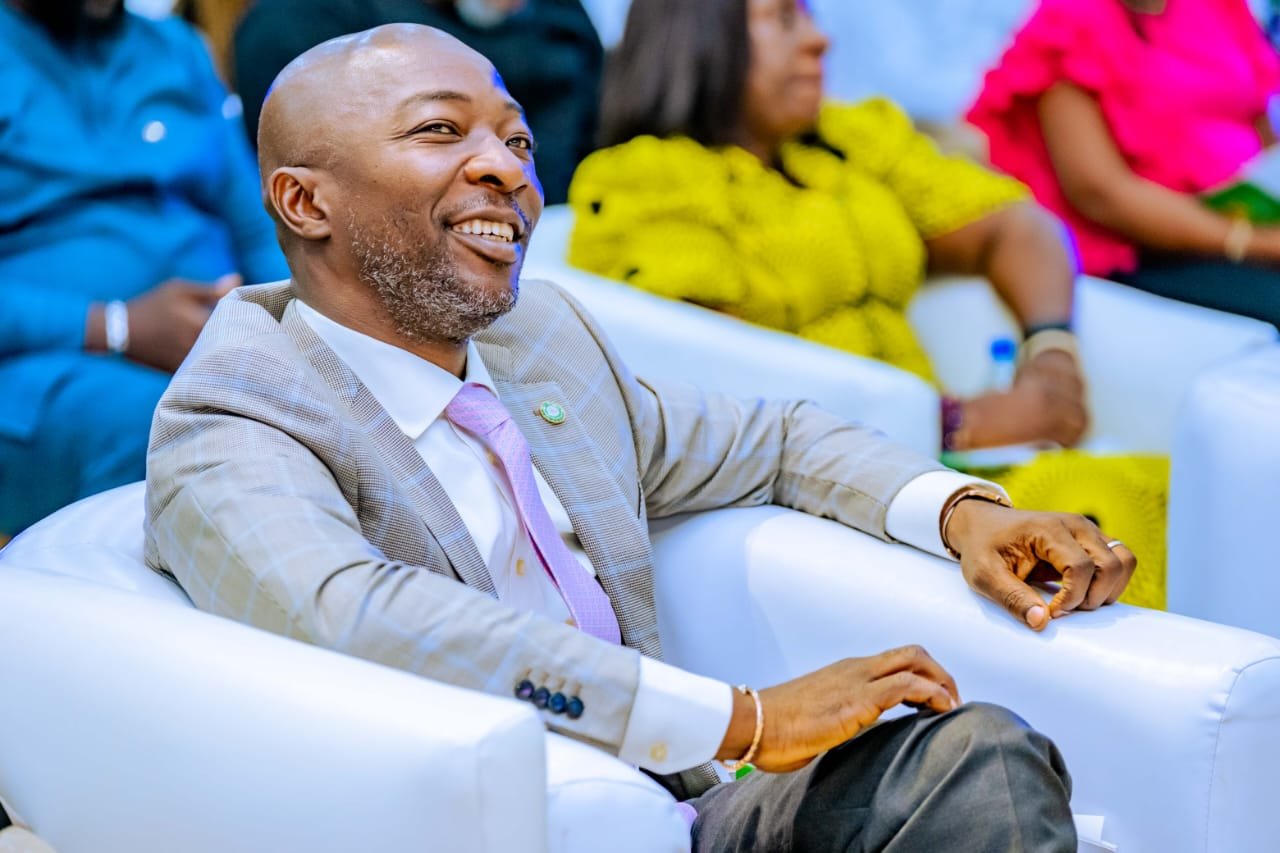
As the NSITF-NECA Safe Workplace Intervention Project kicks off in Lagos, Managing Director of the Nigeria Social Insurance Trust Fund, (NSITF) Barrister Oluwaseun Falaye, has enjoined employers of labour in Nigeria to be intentional about compliance with workplace safety and health regulations as he said that the future is determined by today’s choices.
In his welcome address at the Lagos Stakeholders’ Interactive Enlightenment Forum and Awards Ceremony on Tuesday, Barrister Faleye said, “the future of work in Nigeria will be defined by how much we protect our workforce while driving productivity and growth.”
“At the core of the Employees’ Compensation Act 2010 is a simple but profound truth: every worker matters. No job is worth a life. And no organization can sustainably thrive when safety is treated as an afterthought,’ he stated.
Barrister Faleye urged organizations that are yet to fully align with safety compliance to avail themselves of the event to do so.
He stressed that no job is worth a life, and no organisation can sustainably thrive when safety is treated as an afterthought.
Speaking on the theme of the program: ‘Enhancing Workplace Safety, Strengthening Compliance, Celebrating Excellence’, the NSITF MD said “the theme captures the full spectrum of our engagement today. Compliance must be seen not as a regulatory obligation alone, but as a strategic business decision that safeguards human capital, reduces operational risk, and enhances organisational reputation”.
According to him, SWIP has, over the years, evolved into a strategic platform for driving awareness, strengthening compliance, and fostering collaboration around occupational safety and health, adding that the forum represents a critical interface between policy, practice, and performance, where employers, workers, regulators, and partners engage constructively on how to build safer and more productive workplaces.
“Today’s gathering is not merely an information session; it is a shared commitment. It reflects our collective resolve to ensure that economic growth does not come at the expense of worker safety, and that productivity is anchored on environments that protect lives, dignity, and livelihoods,” he stated.
Speaking on the awards, Faleye said, “today, we also take time to celebrate organisations that have distinguished themselves through demonstrable commitment to occupational safety and health. These awards are not just acknowledgements; they are benchmarks. They signal that compliance is achievable, that safety delivers value, and that excellence in worker protection deserves recognition”.
The NSITF boss thanked the parent Ministry of Labour and Employment, NECA, participating organizations, and other partners for the success of the event and reiterated the Fund’s commitment to “deepen collaborations, strengthen compliance, and promote a culture where every workplace is a safe workplace.”
Explaining the SWIP forum, Director General , NECA, Mr Adewale-Smatt Oyerinde, said safety in the work place should be taken as a fundamental issue and core responsibility of employers.
He said while employers are pursuing maximum or optimum profit, safety of their workers should also be priorities.
He described workplace safety as a life-and-death matter that is still treated with dangerous nonchalance by both employers and employees, despite its far-reaching consequences.
The NECA DG expressed confidence that the initiative would not only reward excellence but also reset the national conversation on workplace safety
The Minister of Labour and Employment , Alhaji Maigari Dingyadi, in a keynote address at the 2025 SWIP kick-off, said the Safe Workplace Intervention Project is a collaborative occupational health and safety initiative designed to enhance workplace safety across Nigeria through structured audits, engagement and recognition.
He said the occupational health and safety is everyone’s responsibility, adding that the ministry cannot do it alone.
He commended NECA and NSITF for sustaining SWIP, describing it as a model of effective collaboration between government and the private sector.
.
In a presentation titled “Employees’ Compensation Act, 2010: The Journey so Far,” the Executive Director Operations at NSITF, Honourable Mojisola Ali-Macauley said that Section 3 of the ECA 2010 makes provisions for Occupational Safety and Health as part of NSITF’s mandate.
She revealed that Scheme has a little less than two hundred thousands organizations translating to around eight million employees under its cover. She further stated that 142,745 persons have so far benefited in one form or another from the Scheme.
Seven companies in the Lagos Region received award for maintaining a high standard of Occupational Health and Safety in their workplaces. While Chivita and Nigeria Breweries received an ambulance each, five others received infrastructure OSH awards of first aid kits, PPEs and other safety gadgets for the workplace.
The SWIP, a partnership project between the Nigeria Social Insurance Trust Fund and Nigeria Employers’ Consultative Association, was designed to promote voluntary compliance with workplace safety standards and regulations by organizations through creation of awareness, safety audit and motivation in form of awards to exemplary organisations. It adopts a method that downplays enforcement.
The NSITF-NECA SWIP Awards 2025 is scheduled for Lagos, Enugu, and Abuja for the grand final.
-
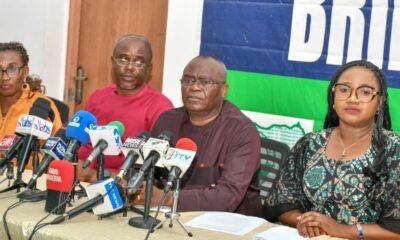
 Cover5 months ago
Cover5 months agoNRC to reposition train services nationwide.. Kayode Opeifa
-

 Fashion9 years ago
Fashion9 years agoThese ’90s fashion trends are making a comeback in 2017
-

 Entertainment9 years ago
Entertainment9 years agoThe final 6 ‘Game of Thrones’ episodes might feel like a full season
-

 Opinion1 year ago
Opinion1 year agoBureaucratic Soldier, Kana Ibrahim heads Ministry of Aviation and Aerospace After Transformative Tenure at Defence
-

 Opinion1 year ago
Opinion1 year agoHon. Daniel Amos Shatters Records, Surpasses Predecessor’s Achievements in Just Two Years
-
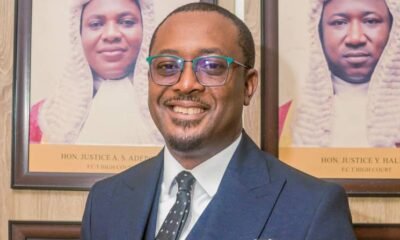
 Opinion2 months ago
Opinion2 months agoBarrister Somayina Chigbue, Esq: A rising legal leader shaping institutioal excellence in Nigeria
-
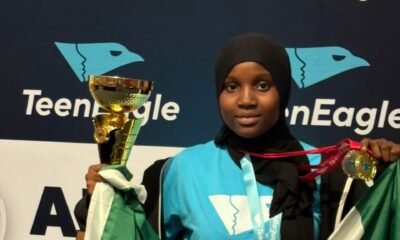
 News6 months ago
News6 months agoNigerian Nafisa defeats 69 Countries at UK Global Final English Competition
-

 Special Report1 year ago
Special Report1 year agoGolden Jubilee: Celebrating Tein Jack-Rich’s Life of Purpose and Impact




